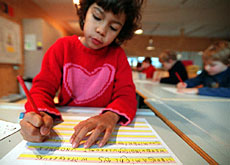
Action plan unveiled to boost literacy

All children should start school by the age of five, and more should be done to help foreign pupils.
These are just two of the measures put forward by education chiefs to improve reading skills, after an international study revealed poor literacy among teenagers.
The Swiss Conference of Cantonal Directors of Education (CDE) unveiled its action plan on Monday in the Swiss capital, Bern, in response to findings by the Programme for International Student Assessment (Pisa), which were published in 2001.
Conducted by the Organisation for Economic Cooperation and Development (OECD), the report found that up to 20 per cent of Swiss 15-year-olds could not understand even the most basic written information.
The less-than-flattering results led the CDE to commission a series of studies, taking a closer look at why Switzerland’s 15-year-olds ranked below average in reading and comprehension when pitted against teenagers from other countries.
Social factor
One of the Swiss studies concluded that the social and economic background of a pupil had an effect on his/her reading skills. This meant that children with well-educated parents performed better.
Children from different cultural and/or linguistic backgrounds were found to be at a disadvantage within the Swiss education system.
This was often because there were no measures in place to help them overcome linguistic difficulties, according to the CDE.
The action plan singles out more assistance for non-Swiss schoolchildren.
“We are going to be very attentive to children who do not have one of the federal languages in Switzerland [French, German, Italian, Romansh] as their mother tongue, and we will have special measures for them,” Anne-Catherine Lyon, education director for canton Vaud, told swissinfo.
Cantons
Given the differences between schools from canton to canton, harmonising primary and secondary education appears to be the way forward for the cantons.
Lyon emphasised that variety was not necessary the spice of life when it came to scholastic systems.
“We cannot have systems that are too different from one canton to the other. For the cantons that are a little bit behind and which have very different way of seeing things, [we] encourage them to join the mainstream.”
Lyon said the age at which children start school should be lowered to four or five – kids in some cantons do not begin school until they are seven years old.
“We’ve seen that, especially for those from disadvantaged social or cultural backgrounds, the sooner they are in the system, the better,” explained Lyon.
Union response
Switzerland’s largest teaching union (LCH) welcomed the plan, but its president, Beat Zemp, told swissinfo that ultimately it was up to the cantons to decide whether to implement or ignore the proposals.
“Each canton is free to take its own actions. That’s a real problem. There’s not much money at the moment to improve the situation of the weakest students.”
The action plan also touches on the role of teachers in schools. It suggests training teachers to make them better equipped to deal with pupils who might be lagging behind the rest of the class.
Lyon said that evaluating teacher performance in Switzerland was an important but delicate issue, especially as Swiss teachers were not used to being evaluated.
“It is very difficult to evaluate what they do, because it’s not like building cars in a factory. You have human beings trying to teach other human beings,” she said.
However, Zemp feels that other issues need to be addressed when tackling how to help struggling pupils.
“What we need is a reduction of workload and a reduction in the number of people per class to really improve the situation of the weaker students.”
swissinfo, Faryal Mirza
The 2001 OECD study found that 20 per cent of 15-year-olds could not understand basic written information.
The report said social and economic factors affected literacy skills.
Education chiefs want to harmonise the scholastic system across Switzerland.
They say children should begin school by the age of five.

In compliance with the JTI standards
More: SWI swissinfo.ch certified by the Journalism Trust Initiative

























You can find an overview of ongoing debates with our journalists here . Please join us!
If you want to start a conversation about a topic raised in this article or want to report factual errors, email us at english@swissinfo.ch.